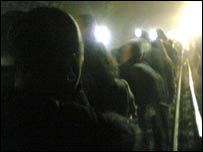WE THE MEDIA

I'm not the only person to have noticed this (even the BBC's head of news Helen Boaden has commented on it) but one of the most striking aspects of the coverage of the London bombings was the way the audience became newsgatherers.
From grainy videos and photos shot by tube passengers on mobile phones to blog entries from people caught up in the attacks, some of the most powerful material of the day came from ordinary people.
In my first (and delayed) podcast, BBC News Interactive's Kevin Anderson suggests that the relationship between the mainstream media and citizen journalists is becoming less hostile and more collaborative as both sides begin to accommodate one another.
Yesterday was a perfect example of how the two can work together -- to the benefit of our viewers and listeners.
As the resolution on mobile phone cameras increases, this user generated content is going to play an ever more central role in the reporting of major breaking news stories.
It's exactly what Dan Gillmor has been predicting.

I'm not the only person to have noticed this (even the BBC's head of news Helen Boaden has commented on it) but one of the most striking aspects of the coverage of the London bombings was the way the audience became newsgatherers.
From grainy videos and photos shot by tube passengers on mobile phones to blog entries from people caught up in the attacks, some of the most powerful material of the day came from ordinary people.
In my first (and delayed) podcast, BBC News Interactive's Kevin Anderson suggests that the relationship between the mainstream media and citizen journalists is becoming less hostile and more collaborative as both sides begin to accommodate one another.
Yesterday was a perfect example of how the two can work together -- to the benefit of our viewers and listeners.
As the resolution on mobile phone cameras increases, this user generated content is going to play an ever more central role in the reporting of major breaking news stories.
It's exactly what Dan Gillmor has been predicting.

3 Comments:
"BBC News Interactive's Kevin Anderson suggests that the relationship between the mainstream media and citizen journalists is becoming less hostile and more collaborative as both sides begin to accommodate one another."
I'd feel happier about this if the BBC showed more willing to credit the submitters of the media, and to tone down the rights from "now you've submitted it, we can use it for absolutely anything we want" to "we're going to publish your material only in relation to the story to which it was originally submitted".
Stuart
since weblogs are playing a great part in this media revolution, we could add basic commercial licensing info to RSS feeds so that the credit (and reward) part of the media revolution is taken care of. It 'd be a natural extension of CC licensing framework (which now mostly take care of non-commercial exchange taking place between "peers" on the Internet) and should focus on the fact that on one side of the media revolutions are professional subjects like newspapers and Tvs (with revenues models largely independent from the web), which are tapping a valuable newsgathering resource. Last year we floated a proposal of this kind called Internet Newsgathering,which did not receive much feedback, if that makes sense to you, especially in the light of recent developments in citizen media etc, please contact me at lorenzoATlulop.com
Interesting posting. I've found so many interesting blogs, with very human stories about what happened last Thursday. Many have been more informative than some of the UK news sites.
Janet
(www.lordcelery.blogspot.com)
Post a Comment
<< Home